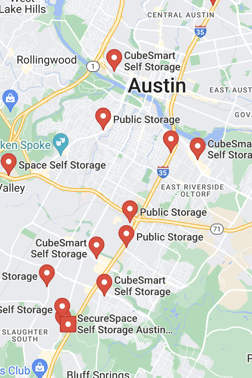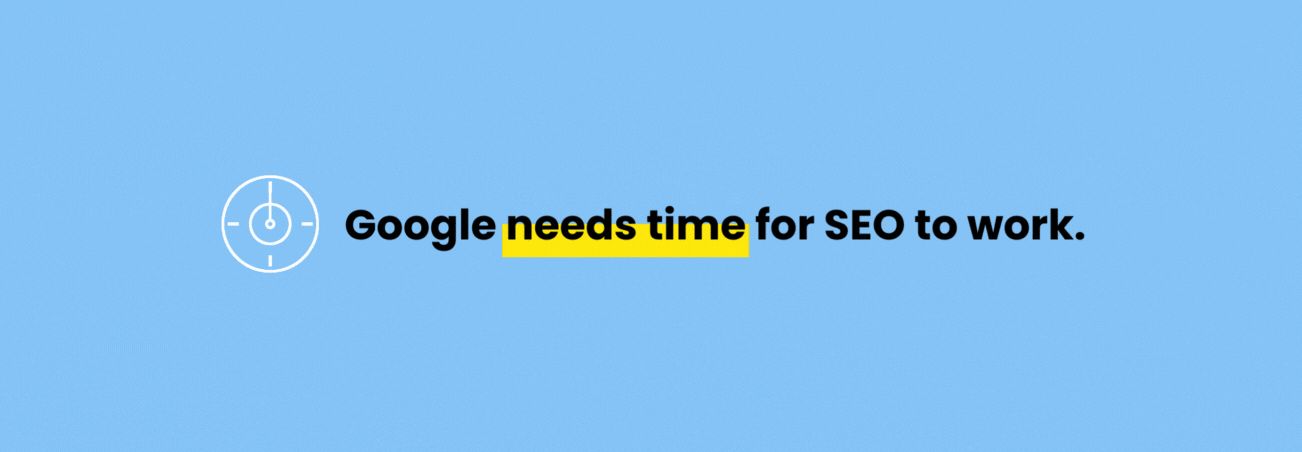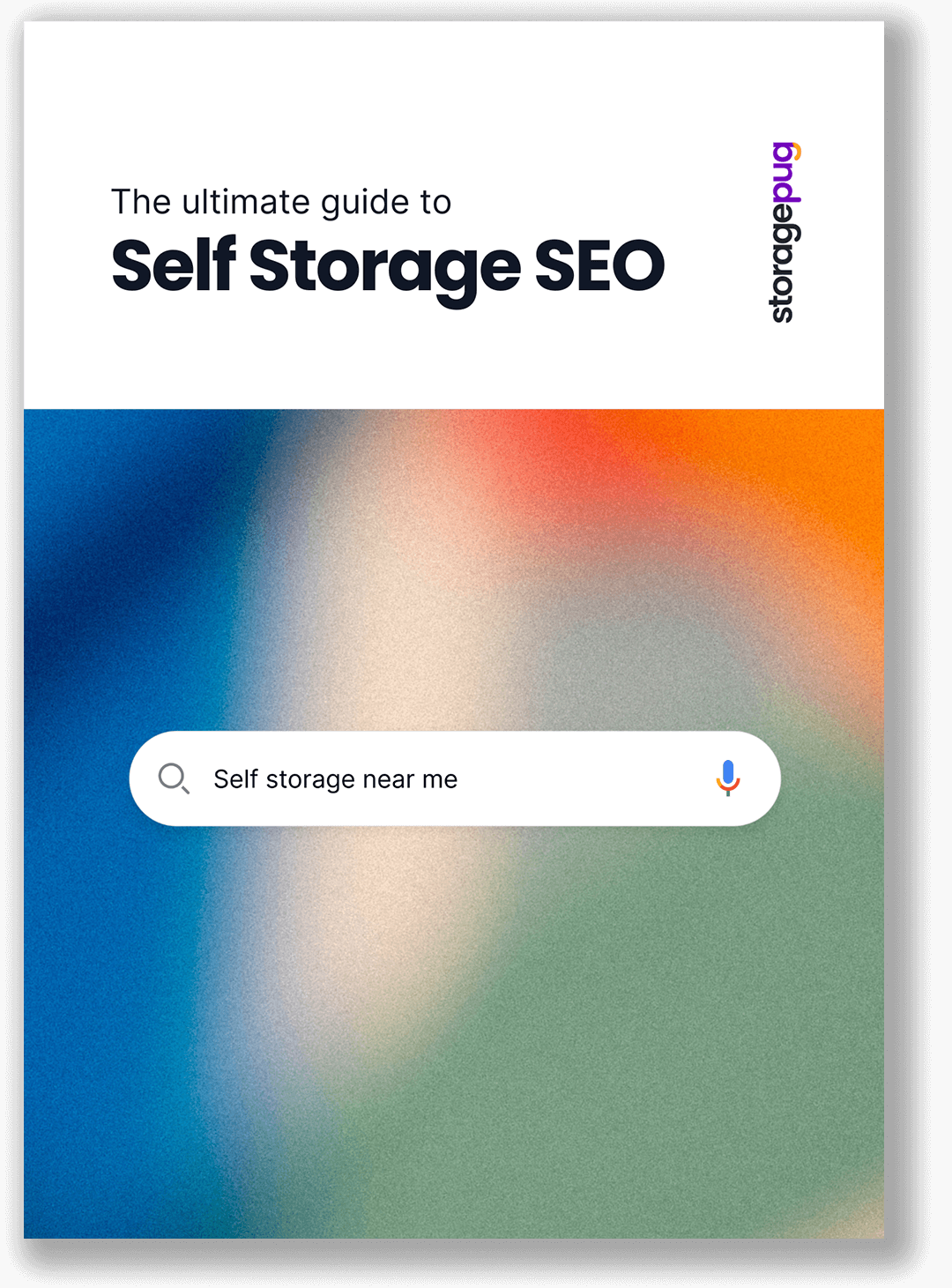StoragePug does SEO!
That’s the first myth we need to dispel. Every aspect of our websites is designed to create a strong SEO presence for our clients.
But what else might you have heard about SEO that isn’t true? Read on to find out!
At StoragePug, we run into a lot of self storage SEO myths.
These myths aren’t dumb. Some of them were true at one time, but Google’s algorithms have changed so that they aren’t true anymore.
Some of them are still true but heavily overvalued.
Some of them are implied by marketing companies looking to scare storage operators into spending money on “ongoing SEO updates” that they don’t need.
We know how to turn self storage SEO into rentals. We also know what tactics don’t work or aren’t worth your time!
Here are 7 SEO myths to watch out for.
Myth #1: I need to be rank one!
The Myth: if you’re not number one on Google, your website is failing, you won’t get rentals, no one will see you, etc. etc.
The Truth: Rank one on Google is great. If the Google Genie offers you the spot, you should take it. But there’s a lot more to it than that, and if you’re not rank one, you can still meet your goals.
Here’s the short version:
- Rank 1 is very hard to get (if not impossible) in competitive areas
- Rank 1 doesn’t necessarily increase rentals
- Obsessing over rank 1 focuses effort on the wrong goals
- Rank 1 (or 2, or 3) isn’t needed to succeed
And here’s the long one:
Ranking in the top spot on Google often ends up being a vanity metric. By that, I mean people love to see themselves at the top of the heap, but it isn’t a good goal.
Your goal should be to bring in rentals. If that means your website ranks 87th for “storage units in Austin, TX,” but you get plenty of online rentals? That’s way better than ranking 1st and getting no rentals!
Rank 1 differs for each keyword, too. The results for “storage units in Austin, TX” will be different than “self storage near Austin, TX.” Which one is more valuable for your facility?
And will that answer still be correct in a month? People’s search habits change, and even if you use a professional SEO research tool like ahrefs or Semrush, the organic search volume numbers are just estimates!

Especially for niche keywords and industries like ours. Google publishes the only real keyword search volume data, and they only give us the numbers in incredibly broad buckets - like “10-100,” “100-1,000,” and “1,000-10,000.”
SEO tools add in extra data they get from other sources to try and narrow those massively broad estimates into more useful numbers. This still ends up being nothing more than an educated guess.
 Sometimes the appropriate keywords are obvious - “mini storage” is worse than “self storage” across the country. But the exact phrasing is ambiguous, so you may put all your effort into getting rank one for the keyword people aren’t even using!
Sometimes the appropriate keywords are obvious - “mini storage” is worse than “self storage” across the country. But the exact phrasing is ambiguous, so you may put all your effort into getting rank one for the keyword people aren’t even using!
Then we get to the difficulty of getting rank one for any particular keyword. If the keyword has any value at all, you won’t be the only website playing for it.
Getting rank one for a high-value keyword (storage units near me) is going to be incredibly difficult for a small business. You need dozens of backlinks, maybe hundreds. You may need huge volumes of traffic. You’ll need to match and then surpass the REITs and their massive marketing teams.
All for uncertain gains.
This used to be how SEO worked in every industry. Google could only differentiate sites by backlinks and direct keyword matching. But, luckily for small storage operators everywhere, the algorithms are much smarter now.
Self storage searches are local. Google knows that anyone searching for self storage units is most likely looking to rent one - and they’re not going to rent one across the country from their location!
Google (and the other search engines) will produce results that are near the searcher's location.
Your website will show up for searchers if you’re a good option. “A good option” means:
Only after these three conditions are met does your self storage SEO start to matter. You want to be the best option for people who might actually want to rent from you. You don’t need to be Rank One for that to happen.
Verdict: False. You don’t need to be rank one (or two, or three) for your website to get the job done. Local search results get more clicks than organic results.
Myth #2: I need to update my SEO regularly
The Myth: If I don’t have someone doing ongoing SEO updates, my site will fall behind!
The Truth: Updating your website every few weeks won’t help your rankings. In fact, it might actually hurt your positioning!
You may have heard this before - a marketing company promising to perform “ongoing SEO updates to improve your ranking.” They make a persuasive case, and the cost may not be as bad as you would have guessed!
Ongoing SEO updates are inexpensive because they don’t take much work, and they don’t take much work because they usually aren’t doing much.
Don’t get me wrong - self storage SEO is incredibly important. If you aren’t ranking well (which means you aren’t getting leads through your website), an SEO audit can help solve the problem.
Most of the time, this myth ties into the one above. The pitch is that SEO updates can improve your ranking or get your business that top spot.
This is generally not true. If your SEO was done right the first time, updating it won’t improve your ranking. Extensive updates could even hurt.

Google needs time to understand and correctly place your website. It can’t crawl every page every day or even every week. Once your website is crawled and indexed, you’ll have to be patient while Google figures out where it should rank.
New websites take 3-6 months to reach their peak SEO performance. We see this in StoragePug’s own blogs, too!
If you significantly update your website during that time, you risk starting that timer over.
This doesn’t apply to small changes like updating your best discounts or changing a calendar of events. Little changes like that won’t hurt - but they won’t help, either, unless they help your customers.
Old-school SEO was about gaming the system. Modern SEO is about clarity and customers. If your websites follow best practices (like StoragePug websites do), you likely just need to be patient.
Verdict: False. If your website was built correctly the first time, minor tweaks and changes aren’t going to help you rank better. Google takes time to correctly rank your website, and changing it often can make that take even longer.
Myth #3: If I don’t use a keyword, I won’t rank for the term
The Myth: If I don’t have a keyword on my website, I won’t show up if someone searches for it.
The Truth: Google understands much more than it used to and you don’t need to include every possible keyword on your site.
This is another holdover from the early days of SEO. One of the ways Google originally determined what websites to give searchers was by matching the query to the content on a website. If you didn’t have the exact query text in your content, you probably weren’t going to show up as an option.
That’s no longer the case.
Have you tried ChatGPT?
Computers are much, much better at understanding language than they used to be.
.gif?width=1302&height=452&name=7%20SEO%20Myths%20To%20Watch%20Out%20For4%20(1).gif)
Old-school SEO would sometimes even involve using common misspellings in your keywords to capture those searchers. Today, Google understands that your self storage website is also about mini storage and storage units and storage space for furniture near me.
Google also knows where your business is, and what it’s near.
Listing areas near your business can (probably) help you show up for queries containing the area names, but you don’t need your neighborhood on the website for your business to show up.
If you have enough context on your website for Google to understand your purpose, that’s good enough. Beyond that, only include information that will be useful to your customers. Google is in the business of making searchers happy. If your website makes searchers happy, Google will keep showing it as a good option!
Verdict: Incomplete. Keywords play an important role in teaching Google’s robots what your business does - but they no longer need to match a search exactly. Consistent, user-focused content is much better for your SEO.
Myth #4: SEO requires hiring an expert
The Myth: SEO is super complicated and you need an expert to get your website to rank well.
The Truth: While SEO can be very complicated, the most important parts of self storage SEO can be handled by the business owner.
If you hire a good web developer to make your website, all the technical aspects of SEO should be done already. That includes:
- Site load speed
- Schema markup
- ADA compliance
- Site security
- And more
If you don’t have a good website, then yes, you absolutely should hire a professional for that.
But if you do?
The most important facets in self storage SEO come down to the relationship between you and your community.

Reviews, photos, and quality links are three of the most important ranking factors for self storage SEO - the other is proximity, and once your facility is built, that one is out of your hands.
All three are directly under your control!
If your SEO is struggling, the best thing anyone can do for you is to get new (good) reviews, beef up your GBP with quality photos, and get you listed on aggregators and other websites.
Check out this article for how to get reviews for your self storage facility and this one for self storage photography.
For links, consider small business associations, community groups, sponsorships, and any other local groups you have a relationship with. Your local Chamber of Commerce is a great place to start.
Verdict: Mostly false. For a self storage business, the most important parts of SEO are well within your control. Once you have a good website (read more about what makes a good self storage website here), focus on getting reviews, getting your name out there via links, and ensuring your GBP is in good shape.
Myth #5: I need a blog
The Myth: Regularly updating a blog will help your SEO and make you rank higher.
The Truth: While content is an important part of self storage SEO, a blog isn’t.
Google divides queries into intent. The two relevant intents here are transactional (I want to buy something) and informational (I want to learn something).
Blogs generally fall into the second category, while the searchers you’re looking to attract are in the first.
When someone searches for information, Google can pull that information from the most relevant, accurate, authoritative source on the internet.
When someone searches for a storage unit to rent, the only good options are storage businesses that are physically close to the searcher.
Think about what that means for your competition. For renters, you’re one of ten, maybe twenty options.

For those looking to learn about storage with questions about what to store or how to store it, you’re competing with every storage company in the English-speaking world. This means every REIT, every aggregator, and every tertiary company.
Depending on the question, your blog may even be competing against ours!
The numbers alone mean you’re unlikely to be on the front page of any related search result, but your competition is also significantly bigger than most storage operators. So it’s a nigh-impossible game to win.
And even if you do win, what next? Informational searchers from across the country will land on your blog - which is great!
But they aren’t going to rent your storage units, are they? They could be a thousand miles away! And if you’re out there writing blogs that could make someone drive across the country to rent a storage unit, maybe consider a career in screenwriting instead.
Verdict: Very false. Storage operators don’t need a blog. If you enjoy writing a blog, it won’t hurt but don’t expect it to drive rentals.
Myth #6: Meta descriptions make or break my SEO
The Myth: Meta descriptions are a hugely important ranking factor and need to include every keyword you want to rank for!
The Truth: Meta descriptions aren’t a ranking factor at all anymore. The only way they help or hurt your SEO is by getting people to click on your link!
A good meta description follows Google’s guidelines (shorter than 158 characters) and makes a good pitch to your ideal customers. Be clear about who you are and what you offer without trying to cram anything extra into it.

Think about which amenities and features your customers care most about. If you’re not sure which ones to highlight, check out our Top 9 Self Storage Amenities playbook.
Now, your meta title is a ranking factor, but it also needs to be very short, so there’s a limit to what you can do with it. Google advises using less than 60 characters for a meta title.
With that little room, the best you can do is mention what you offer - “Self storage units in City, State” - and try to squeeze in your top offer. 24/7 access, climate control, and pest control are all good options for this.
Verdict: Misleading. Meta descriptions matter, but you should write them to get your ideal customers to click, not to appease our Google overlords. And keep them short!
Myth #7: My site must load instantaneously
The Myth: If your page load speed is below Google’s standards, you’re in trouble. (Most often, this comes up when people use SEO audit tools like AHrefs or semrush).
The Truth: Slow page load speed will indeed hurt your website - but there are important tradeoffs and caveats to take into account.
Number one is that Google has said that only websites with the “slowest experience” will have negative effects from their load speed. Google doesn’t give much specific advice, so when we get some, it overrides anything we believed before.
Second, the target load time is pretty fast - specifically, most of the page must be loaded within 2.5 seconds. You’ll hear terms thrown around like LCP (Largest Contentful Paint), FIP (First Input Delay), and CLS (Cumulative Layout Shift), but you don’t really need to worry about those.
Lots of websites fall short of the ideal metrics. We even found that Amazon was taking longer than 2.5 seconds to load! And clearly, they’re doing fine.

These measurements are also dependent upon the connection of the person loading the page, so you may get different measurements for the same website and hosting platform.
Third, simple websites load faster - but they don’t always serve your customers well.
Wikipedia loads very, very fast. Wikipedia is also a nonprofit that isn’t selling anything to anyone.
Amazon also loads fast - but not quite as fast, because they need to load a lot more. They use videos to advertise their streaming services, countdown timers for sales, account information, targeted product offerings, and all sorts of other stuff.
A good storage website must look good, have useful features, have video features, and actually show the tenants what units are available for rent. Those assets show visitors what type of business you’re running. If you do them well, your website will convince people to rent from your storage facility instead of the competition.
A good self storage website needs to look better than Wikipedia, and that will slow your load time down. So, you’re looking for a website that looks good and still loads quickly.
If your website loads in 3 seconds instead of 2.5, Google isn’t going to penalize you for the difference. If your website takes 6, 7, or 8 seconds to load? Then you’re in trouble.
Verdict: Overblown. SEO audit tools will show your website is loading too slow with bright red warning signs - but if it doesn’t feel slow to you, Google is unlikely to care. Attractive websites convert leads into customers.
To learn more about self storage SEO, check out:
Self Storage SEO: How to Choose Keywords
What is Local Self Storage SEO
19 Essential Self Storage Marketing Ideas [2023]
At StoragePug, we build self storage websites that make it easy for new customers to find you and easy for them to rent from you.




 Sometimes the appropriate keywords are obvious - “mini storage” is worse than “self storage” across the country. But the exact phrasing is ambiguous, so you may put all your effort into getting rank one for the keyword people aren’t even using!
Sometimes the appropriate keywords are obvious - “mini storage” is worse than “self storage” across the country. But the exact phrasing is ambiguous, so you may put all your effort into getting rank one for the keyword people aren’t even using!
.gif?width=1302&height=452&name=7%20SEO%20Myths%20To%20Watch%20Out%20For4%20(1).gif)





